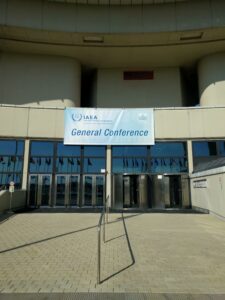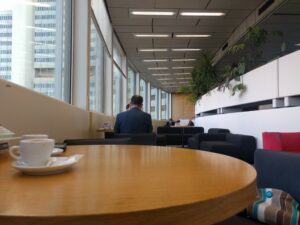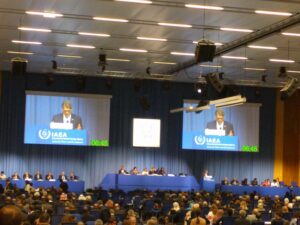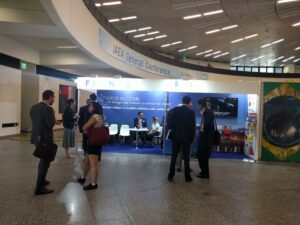Engaged Anthropology Grant: Anna Weichselbraun

In 2013 while a doctoral student at the University of Chicago, Anna Weichselbraun received a Dissertation Fieldwork Grant to aid research on “Regulating the Nuclear: The Textual Production of Technical Independence at the International Atomic Energy Agency,” supervised by Dr. Joseph Maco. Building upon her fieldwork Dr. Weichselbraun then received an Engaged Anthropology Grant in 2018 to aid engaged activities on “Designing Effective and Credible Nuclear Safeguards.”
My dissertation research explored the practices that make up the production of “nuclear safeguards”—the verification of states’ international legal commitments to not build nuclear weapons. It asked the question: How, against accusations of politicization, does the IAEA demonstrate “technical independence” in order for its judgments to enjoy global legitimacy? During 24 cumulative months of archival and ethnographic research at the International Atomic Energy Agency (IAEA) in Vienna, Austria and at the US National Archives, I explored this question at nuclear safeguards workshops and training courses and during a twelve-month internship in the safeguards department’s training section. There I joined newly hired inspectors in the training course for their job over the course of six months. I interviewed inspectors, analysts, and technicians throughout the department about their work and about what the competencies they thought were necessary to do safeguards properly. I attended the IAEA’s annual General Conference and followed debates in the policy-making bodies. I also interviewed editors, writers, and translators about the production of texts across the Agency.

My research showed that nuclear safeguards are highly constrained by politically normative expectations about appropriately technical knowledge. Safeguards bureaucrats must constantly demonstrate the supreme technicalness of their findings lest they be accused of being influenced by politics. My work demonstrates that the distinction between technical and political domains at the IAEA has been institutionalized through bureaucratic practice that is imagined to produce “objective” knowledge. Bureaucratization acts as a centripetal force, pulling all attempts to produce knowledge into its vortex. The result is a strong institutional preference for the quantifiable, the calculable, and the predictable. This, however, poses problems for recent attempts to strengthen the nuclear control role of the IAEA which seeks to expand the scope of safeguards activities by including analysis of a wide variety of information in order to paint a more complete picture of the state. “Analysts” are viewed with suspicion as their use of judgment is conflated with bias. Further, this perspective also conceals the role of judgment in the “technical” tasks of the inspectors. I argue that the bureaucratic vision of nuclear control derives from the political imperatives of equal treatment at the time of the organization’s founding, which nevertheless conceal the hierarchical nuclear order.

The Engaged Anthropology Grant allowed me to return to my field site to engage my interlocutors on their continued challenge of designing safeguards that would be technically credible but also politically legitimate. While I had planned to conduct a collaborative workshop with former supervisors and colleagues in the inspector training section, finding a time to schedule such an event proved extremely difficult, and indicates some of the challenges of studying elites with tight schedules who frankly have better things to do than to indulge a visiting anthropologist. In response to an encouraging note from one former supervisor about timing, I planned my visit to the IAEA’s headquarters in Vienna, Austria to overlap with the organization’s annual General Conference, which was both a busy time but also gave me the opportunity to access the building during the entire week with an observer badge. This gave me the freedom to schedule meetings with former colleagues and interlocutors and it also provided opportunities for chance encounters, not to mention further participant-observation.

During the week I met individually with eighteen people including ten current IAEA staff members, two former staff members, three diplomats, and three NGO participants. When I was not having breakfast, coffee, lunch, coffee, drinks or dinner with interlocutors, I was following the general debate in the plenary hall (including Secretary Perry’s bizarre speech) and paying attention to the gossip circulating in the hallways concerning the state of that year’s resolution on safeguards which the diplomats were hammering out. I learned upon arriving in Vienna that the Russian delegation had surprised the usual process by introducing a draft of a resolution on safeguards a few days before the European countries who customarily present a working draft were able to do so. NGO observers and staff were curious as to whether the Russian disruption would threaten the outcome of this year’s General Conference as the draft text brought up issues about the objectivity of safeguards that I discussed in my dissertation.
After days of procedural debate, the resolution included wording that expressed concern with the “objectivity” of safeguards evaluation practices and called for returning the inspector’s work to a “technical” basis. In meetings with IAEA staff during the week, I explained that I thought that the insistence on the “technical” and “objective” would constrain the work that safeguards inspectors and analysts were doing. Instead of defending their safeguards expertise as merely technical, safeguards experts should articulate that their unique contribution was a combination of technical know-how and trained judgment (referring to Daston and Galison’s expression in their 2007 book Objectivity), similar to the kind of evaluative diagnostics a physician does. A staff member in the safeguards director’s office was particularly interested in this line of argument so I wrote up a short memo for internal use detailing this alternative argumentative strategy for describing safeguards expertise. I am in touch with my interlocutors to follow up whether this argument resonates, and to secure possibilities for continued engagement.
This experience has led me to reflect on the role that anthropological knowledge (our own particular expertise) can play in my field site and in similar organizations, and how this form of engagement among elite groups must express itself differently than engagement with disadvantaged or even oppressed communities. One of the reviewers of my application flagged that a project such as I proposed in which I would essentially attempt to advise members of the organization on its challenges would not be acceptable in a “non-Western” community. I agree that the particular form of engagement with our interlocutors should be sensitive to the expectations and needs of their communities. Thankfully, we have decades of reflexive anthropological thinking on these matters to support us as we attempt to engage our research communities. I am extremely grateful to the Wenner-Gren Foundation for the opportunity to do so and look forward to the future opportunities for engagement this grant has made possible.